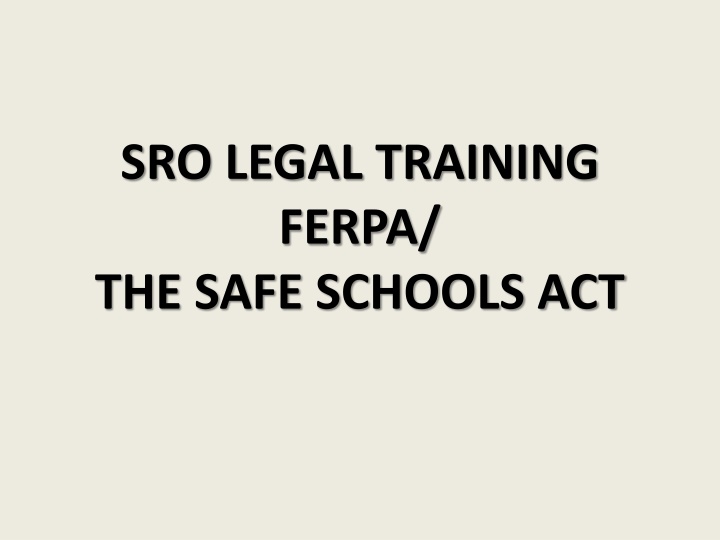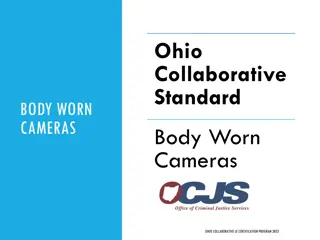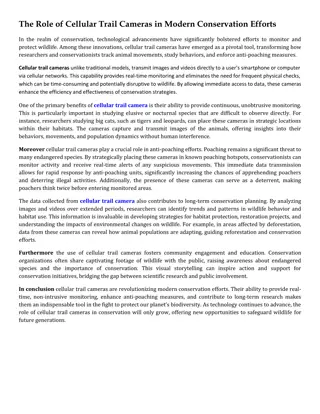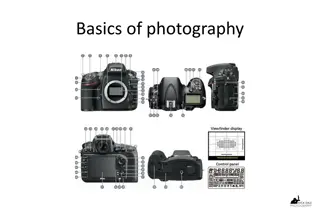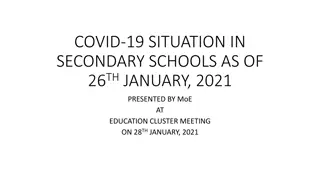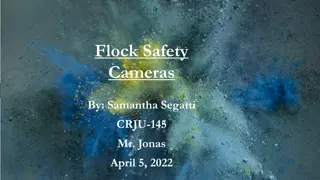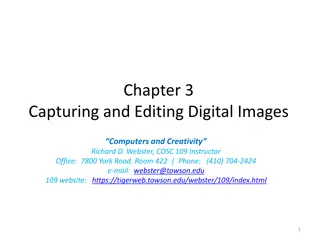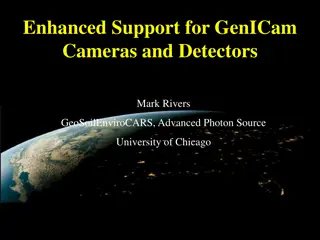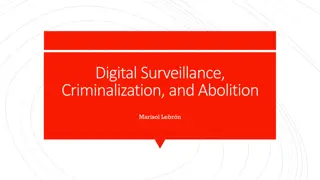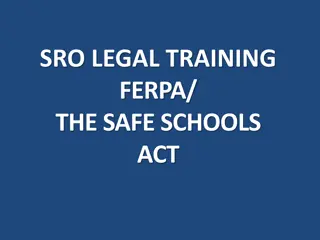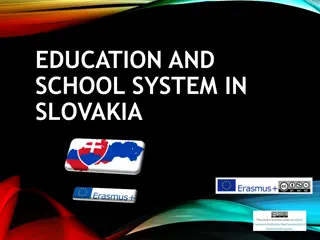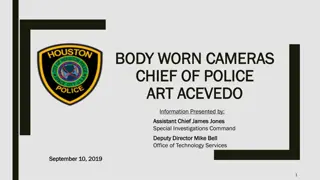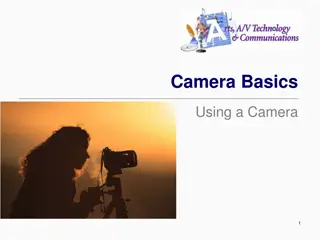Guidelines for Implementing Body Cameras in Schools
This document outlines recommendations for the use of body cameras in schools, focusing on ownership, access, and training protocols. It emphasizes the importance of local law enforcement agency involvement and the role of School Resource Officers (SROs) in complying with state laws and district policies. The guidelines stress the need for clear policies on footage ownership, advance notice to the district, proper use of cameras, and access to recordings for disciplinary purposes.
Download Presentation

Please find below an Image/Link to download the presentation.
The content on the website is provided AS IS for your information and personal use only. It may not be sold, licensed, or shared on other websites without obtaining consent from the author.If you encounter any issues during the download, it is possible that the publisher has removed the file from their server.
You are allowed to download the files provided on this website for personal or commercial use, subject to the condition that they are used lawfully. All files are the property of their respective owners.
The content on the website is provided AS IS for your information and personal use only. It may not be sold, licensed, or shared on other websites without obtaining consent from the author.
E N D
Presentation Transcript
SRO LEGAL TRAINING FERPA/ THE SAFE SCHOOLS ACT
SCOTT SUMMERS DIRECTOR OF SCHOOL LAWS MISSOURI SCHOOL BOARDS ASSOCIATION summers@msbanet.org 1.800.221.6722
AGENDA NEW LAWS FERPA SAFE SCHOOLS ACT CASES QUESTIONS!!
BODY CAMERAS A recording taken by a LE mobile video recorder (body/vehicle camera) that is taken in a non- public location (dwelling, school, medical facility) may be a closed record Upon written request, the following may receive unaltered, unedited copy Person depicted in recording Person/voice in the recording Legal guardian/parent if minor Atty for depicted person Family member if deceased
RECOMMENDATIONS Designate SRO as Law Enforcement Unit Body camera footage taken at the school is the property of local law enforcement agency Created and maintained in accordance with local law enforcement agency policies and procedures Request copies of local law enforcement agency policies/procedures MOU with local law enforcement agency
MOUS Make it clear that camera recordings are the property of local law enforcement agency Require local LE agency to provide advance notice to the district before officers assigned to the district begin using the body cameras Require SROs to use body cams only when performing LE duties and in accordance with state law and the provisions of the local LE agency s body camera program
MOUS Require SRO s to receive training on the program including the proper use and operation of the cameras Include language about district s access to the recordings Local LE agency will if not otherwise prohibited by law provide copies of the footage to the district upon district request If providing a copy is prohibited, LE will facilitate the availability of its officer that made the video to testify, upon district request, in any school disciplinary hearing concerning the facts and circumstances surrounding the videoed incident If camera footage is provided to a 3rdparty (media, parents) LE will provide a copy to district upon request
UNLAWFUL USE OF WEAPONS 571.030.1 A crime to knowingly (10) carry a firearm, whether loaded or unloaded, or any other weapon readily capable of lethal use into any school, onto any school bus, or onto the premises of any function or activity sponsored or sanctioned by school officials or the school board. 571.030.4 Subsection (10) shall not apply to any person who has a valid concealed carry permit
UNLAWFUL USE OF A WEAPON 571.030 Consequence (weapon on district property with NO conceal/carry permit) A Misdemeanor Unloaded E Felony - Loaded
CONCEAL/CARRY LAWS 571.107.1 No concealed carry permit or endorsement shall authorize a person to carry concealed firearms into . . . (10) Any elementary or secondary school facility without the consent of the governing body/school official/school board Unless authorized as SPO
CONCEAL/CARRY LAWS 571.107.2 Consequences Carrying a concealed firearm in an elementary/ secondary school facility by a person holding a valid c/c permit or endorsement shall not be a criminal act, but may subject the person to denial to the premises or removal from the premises
CONCEAL/CARRY LAWS 571.215 States the same requirements as 571.107 Applies to those persons who have a lifetime or extended c/c permit
PARKING LOTS 571.107, .205 Possession of a firearm in a vehicle on the premises of any elementary or secondary school facility shall not be a criminal offense so long as the firearm is not removed from the vehicle or brandished while the vehicle is on the premises.
ALL TOGETHER NOW 571.030 - It is a crime of unlawful use of a weapon if a person comes onto district property with a weapon with no valid c/c permit or endorsement It is NOT a crime of unlawful use of a weapon if the person has a valid c/c permit/endorsement
ALL TOGETHER NOW 571.107 - IF a person has a valid c/c endorsement or permit they are prohibited from carrying the firearm/weapon onto any elementary or secondary school facility UNLESS The school officials/board have authorized it
ALL TOGETHER NOW C/C Consequences IF the person has a valid c/c permit/endsmt. AND the person brings a firearm into the district facility AND the district does NOT allow weapons in the facility THEN it s not a crime, But the person may be barred or asked to leave (trespassing) Subject to fine and permit restrictions
ALL TOGETHER NOW The district is permitted to pass a policy that prohibits weapons/firearms on school property and in school facilities (MSBA Policy ECA/KK) Also may prohibit weapons in vehicles while on district property If weapon is in a vehicle it s NOT a crime District may ban/prohibit person from district property
IN THE INTEREST OF J.L.H. (2016) Off duty police officers receive tip about individual with a gun Officers begin following JLH (14yo) had a hoodie on which fit description He runs They catch him, handcuff, frisk and detained Asked where he threw the gun No Miranda warning Officers started searching for the weapon and found a gun where JLH said he d thrown it Question about whether officers looked there b/c of statement or just were canvasing area
IN THE INTEREST OF J.L.H. (2016) Charged with crime seeks to suppress his statement Court denies motion public safety exception to Miranda Was given SES put on probation Appeals
IN THE INTEREST OF J.L.H. (2016) Court looks to section 211.059, RSMo Expressly states what procedures must be followed when conducting a custodial interrogation of a juvenile No public safety exception! If legislature wanted to have such an exception it would have provided for it Statement is suppressed b/c the statute was not followed!
QUESTIONING A JUVENILE SB 160 (211.059) When child is taken into custody by juvenile officer/LE with or without a warrant the child shall be advised orally and in writing prior to questioning The child has the right to remain silent Any statement the child does make can/may be used against the child in subsequent juvenile court proceedings The child has the right to have parent/guardian custodian present during questioning Right to consult with an attorney and one will be provided if cannot afford one
QUESTIONING A JUVENILE The child has the right to stop talking at any time Any statement the child does make to LE can/may be used against the child if the child is transferred to a court of general jurisdiction to be prosecuted under general law The JO shall halt or discontinue any questioning by LE upon notice from the child that the child wishes to stop being questioned The JO shall ensure a child is advised of the limited role of the JO during questioning by LE and specifically advise the child that the JO is NOT legal counsel for the child or an advocate for the child during questioning by LE The JO shall not participate in the questioning by LE by asking any questions or soliciting any information from the child regarding the alleged offenses
STATE OF MISSOURI v. WILLIAMS (2017) Student (Williams) arrives at school 30 minutes late with group of young men. School safety employee (not an SRO) instructed the group to remove their shoes and all items from their pockets, then go through a metal detector. Williams goes through undetected. Then after that, employee hand checks Williams pat down back pocket. Williams says stop. Goes to security office. There, employee demands Williams remove what was in his pocket. Williams removes a white, rocky substance in plastic wrapping. Williams said it is dope. Williams is handcuffed, resource officer called, drugs seized, Williams taken into custody. Read his rights during this process. Charged as an adult with C Felony of Possession of Controlled Substance. At trial seeks to exclude evidence of the hand search 24
STATE OF MISSOURI v. WILLIAMS (2017) Security personnel stated he searched pursuant to district/school policy Students required to pass through a metal detector to enter school But any student who was late 30 minutes or more was hand checked according to policy Hand check remove all items from pocket and even, maybe shoes. Pull pockets out. Pat down of sleeves and pockets down to the ankles Purpose of policy to ensure student, staff, teacher safety Late arrival triggered the suspicion 25
STATE OF MISSOURI v. WILLIAMS (2017) Issue 4th Amendment Search Remember New Jersey v. T.L.O. Reasonable suspicion not probable cause Reasonable at inception Reasonable in scope Pottawatomie v. Earls/Vernonia v. Acton Suspicionless searches No reasonable suspicion needed but there is a balancing test Individual privacy versus safety of public (schools) If reasonable and minimal then ok (think random drug testing) 26
STATE OF MISSOURI v. WILLIAMS (2017) Here not a T.L.O. case b/c there was no reasonable suspicion to initiate the search And, the search wasn t reasonable under the suspicionless requirements No evidence there was any more of a threat of drugs with students who were late than with any other students No background evidence either Nothing pointed toward this invasion of privacy without any type of suspicion Search overturned and statements inadmissible Have some sort of suspicion before initiating a search!! 27
FAMILY EDUCATIONAL AND PRIVACY RIGHTS ACT FERPA
WHAT IS IT? Federal law protecting student educational records A parent has a right to access, seek to amend and have some control over the disclosure of personally identifiable information from the student s educational records
GENERAL RULE Student education records cannot be released without the written consent of a parent/ guardian or eligible student Unless an exception applies Or there is a court order
WHO IS A PARENT? Biological parent, guardian, individual acting as a parent in the absence of the parent/guardian Eligible student reached age of 18 or attending a post-secondary institution
WHAT IS AN EDUCATION RECORD? Records that are Directly related to a student Maintained by an educational agency or institution Or a party acting for or on behalf of the agency institution May include biometric records (DNA, fingerprints, etc.)
EDUCATION RECORDS Do NOT include Information obtained by direct observation or received orally Records kept in the sole possession of the maker to use as a memory aid Records maintained by a law enforcement unit of the district Personnel records of the district Information collected about student now alum
PERSONALLY IDENTIFIABLE INFORMATION Information that alone, or in combination, is linked or linkable to a specific student that would allow a reasonable person in the school community who has no personal knowledge of the relevant circumstances to identify the student with reasonable certainty EX name, mother s maiden name, address, DOB, SSN, parent s name
DIRECTORY INFORMATION Most common FERPA exception Personally identifiable information (PII) that is not generally considered harmful or an invasion of privacy if it is disclosed NO student ID or SSN MAY include student ID if on badge District decides what, if anything, to include/not include as directory info (Policy JO)
DIRECTORY INFORMATION Districts must notify parents annually and allow parents to opt out If parents don t opt out, then district is able to disclose without the need for prior written consent The district is able to limit who directory info will be provided to or may limit info only be provided for specific reasons Regardless district may still require student to disclose name, identifier, or institutional email
COMMON EXAMPLES Grade level Date/place of birth Parent name, address, contact info Awards/honors Coursework displayed by district Photos, videotapes, digital images, recorded sound Etc ??
FERPA AND LAW ENFORCEMENT
WHAT WOULD YOU DO? You are employed by your local police department and have been assigned, with an MOU, to work at a local school district as an SRO. You are investigating an current student s involvement in an incident of vandalism at the school and on district property. You request the student s education records, including his home address, phone number, attendance records, and grades from the school counselor. You want to use this information for disciplinary proceedings with the school and also seek restitution for damages. You have a video of the incident which shows the student damaging the property.
WHAT WOULD YOU DO? Records Address/phone number directory information Know your district policy on this!! Grades/attendance No not directory information Need parental consent Unless SRO is designated as a school official that has a legitimate educational interest in the records
THE BASICS Law enforcement agencies unconnected to district have no FERPA authority to receive student education records No automatic exception to law enforcement to receive records from school May receive if consent or other exception applies
THE BASICS Biggest exception Directory Information School MUST designate what is directory info Policy JO (MSBA) Subpoena/Court Order/Warrant Easiest way for outside entities to get records! But LE agencies don t like to do this Meet with them and discuss what FERPA is and why they need one
WHAT WOULD YOU DO? District provides SRO with education record SRO then discloses PII from education record to 3rd party (Prosecutor, Police Dept. etc.) Is this ok?
SCHOOL OFFICIAL In certain cases, SRO s may be considered a school official with legitimate educational interest Perform an institutional service or function for which the agency or institution would otherwise use employees Is under the direct control of the agency or institution with respect to use and maintenance of education records Is subject to requirements in federal law governing use and re-disclosure of PII from education records
SOWHATS A SCHOOL OFFICIAL? Includes a teacher, school principal, board president, chancellor, board member, trustee, registrar, counselor, admissions officer, attorney, accountant, human resources professional, information systems specialist, support/clerical personnel Contractor, volunteer, or other party to whom school has outsourced institutional services or functions if performing a service or function the school would otherwise use employees to perform AND The party is under the direct control of the agency or institution with the respect to use and maintenance of education records
SCHOOL OFFICIAL Also must meet the criteria specified in the school district s annual notification of FERPA rights for being a school official with a legitimate educational interest Legitimate educational interest if official needs to review an education record in order to fulfill his or her professional responsibility Notification means that parents now that SROs have access to children s educational records
SCHOOL OFFICIAL SRO wants to view a student s educational records First question is why for what purpose? School Law Enforcement If for LE you don t get them unless you re a school official But then must show you have legitimate educational interest in getting them
SCHOOL OFFICIAL Discipline (Example) Yes, discipline is legitimate educational purpose But is SRO really involved in the school discipline (we advise not to be!) Not involved no LEP What if you are also the Law Enforcement Unit as well as the school official? Need to review student statements maintained as an educational record to determine if student committed a criminal act on campus Yes! SRO gets records BUT Can t re-disclose to outside LE agency (unless consent or exception applies!!)
SCHOOL OFFICIAL So Any records shared with SRO cannot be re- disclosed to other law enforcement agencies Usually this is why the SRO wants the records Need to have a frank conversation with law enforcement agencies/prosecutor about this and tell them why you are not able to provide these records
LAW ENFORCEMENT UNIT What is a LEU? any individual, office, department, division, or other component of an educational agency or institution, such as a unit of commissioned police officers or non- commissioned security guards, that is officially authorized or designated by that agency to Enforce any local, State, Federal law, or refer to appropriate authorities a matter for law enforcement of any local, State or Federal law against any individual or organization other than the agency or institution itself, OR Maintain the physical security and safety of the agency or institution
